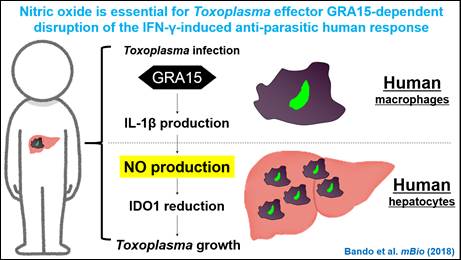Inducible Nitric Oxide Synthase Is a Key Host Factor for Toxoplasma GRA15-Dependent Disruption of the Gamma Interferon-Induced Antiparasitic Human Response (Yamamoto Lab, in mBio)
Toxoplasma, an important intracellular parasite of humans and animals, causes life-threatening toxoplasmosis in immunocompromised individuals. Interferon-γ (IFN-γ) is produced in the host to inhibit the proliferation of this parasite and eventually cause its death. Unlike mouse disease models, which involve well-characterized virulence strategies that are used by Toxoplasma to suppress IFN-γ-dependent immunity, the strategies used by Toxoplasma in humans remain unclear. Here, we show that GRA15, a Toxoplasma effector protein, suppresses the IFN-γ-induced indole-2,3-dioxygenase 1-dependent anti-parasite immune response in human cells. Because NLRP3-dependent production of IL-1β and nitric oxide (NO) in Toxoplasma-infected human cells is involved in the GRA15-dependent virulence mechanism, blocking NO production or IL-1β in the host could represent a novel therapeutic approach for treating human toxoplasmosis.
This article was published online in mBio on Oct 9, 2018
Inducible Nitric Oxide Synthase Is a Key Host Factor for Toxoplasma GRA15-Dependent Disruption of the Gamma Interferon-Induced Antiparasitic Human Response
Hironori Bando, Youngae Lee, Naoya Sakaguchi, Ariel Pradipta, Ji Su Ma, Shun Tanaka, Yihong Cai, Jianfa Liu, Jilong Shen, Yoshifumi Nishikawa, Miwa Sasai, and Masahiro Yamamoto
Links
- Home
- Achievement
- Research Activities
- Inducible Nitric Oxide Synthase Is a Key Host Factor for Toxoplasma GRA15-Dependent Disruption of the Gamma Interferon-Induced Antiparasitic Human Response (Yamamoto Lab, in mBio)








